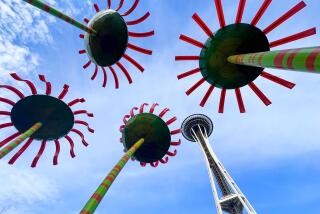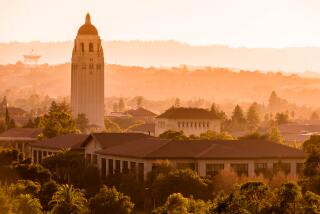Like It or Not, We’re All in the Same Boat
- Share via
The world economy is about winners and losers, and last week one of the big winners, billionaire banker Edmond J. Safra, chose death by burning in a barricaded bathroom of his Monaco penthouse rather than risk opening the door to enemies he incorrectly thought were lurking there. If Safra had felt less alarmed over the demons outside, he could have saved himself.
It’s a fitting analogy for the leaders of the World Trade Organization, who were blindsided in Seattle by events they let get out of control. They were winners when they arrived last week in a town celebrated for its success in international trade and the instant millionaires created in its wake. Host Bill Gates had expected the meeting to be a celebration of the new world order that he, as much as anyone, has wrought. Here, too, the rabble was at the door.
However, it was not the hundred-odd anarchists who were menacing. They were, like ghetto thugs, only a reminder of the ultimate cost of things going wrong. But we do owe them thanks, for without their militancy, the media would have continued to ignore the WTO and all other elitist and mostly secret arrangements being made for our future. Tear gas clarifies the media horde’s thoughts like no other stimulus and gets the cameras whirring.
Who even knew until last week of the power of the WTO to make a mockery of representative democracy by simply overriding congressional and state legislation concerning the environment and labor rights? But suddenly this innocuous-sounding but all-important business of world trade arrangements was front-page news.
It will remain so because the real shock was the sight of tens of thousands of ordinary folks marching peacefully through Seattle, people who have known the delights of a Starbucks Frappuccino and Microsoft Windows and yet are dissatisfied with what they can glimpse of the economic future. They spoke the language of losers, of things gone wrong--threatened turtles, child labor, genetically altered food--that the winners no longer expected to have to hear. Indeed, trade unions are back in vogue.
It was bound to happen. Too many people are working hard and not getting ahead while they read constantly of the exorbitant wealth garnered by others. Last Friday, the stock market rose hundreds of points on the “good news” that average hourly wages had risen only 2 cents in the previous quarter. The fact that more than 44 million workers earn less than $10 an hour was reassuring to the upper echelon that drives the market and has seen its net worth multiply in a few years. But that’s hardly a “living wage” for many full-time workers in prosperous America who, in these best of times, aren’t doing well.
The media have focused on the winners, but the losers are widely dispersed among us. In Seattle, teachers, apple growers and Boeing mechanics were in the ranks of those who showed that they feel left out. What they were saying is that they are all for a new world order as long as it includes them and the things they care about--decent wages and job security, clean air and water and a proper respect for human rights.
Multinational trade depends on the power of strong national government to enforce its terms. That is why Microsoft and Disney push President Clinton to insist on strong international copyright protections. Ironically, free trade requires major political intervention. But if our government is expected to protect big business interests internationally, it must do no less for ordinary Americans.
The logic of unregulated trade is that it will throw up winners and losers without any obligation to do what is right. A teacher will not be rewarded as handsomely as some hustler with an Internet gimmick. Top multinational executives will cream off far more than their workers. But when the rewards become obscenely skewed, there is the basis of resentment and indeed revolt. In the democratic societies of the West, as French farmers have shown, that revolt is all the more potent.
In the end, the newly minted billionaires who have made out like bandits in the multinational economy will not find the solace of their rewards behind high gates or deserted islands. They must learn to live with the rest of us. Banker Safra made the Fortune list of top billionaires, but there was no island that he could retreat to for escape from the harsh realities of this world. The saving grace of the human condition, the brutal fact that compels sweet charity and which the power brokers of Seattle forgot, is that we are all in the same boat.
More to Read
Sign up for Essential California
The most important California stories and recommendations in your inbox every morning.
You may occasionally receive promotional content from the Los Angeles Times.













